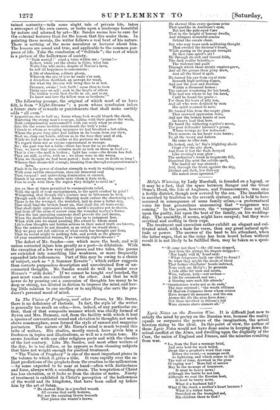Warning, by Lady Marshall, is founded on a legend, or
it may be a fact, that the space between Bangor and the Great Orme's Head, the Isle of Anglesea, and Penmaenmawr, was once a fertile district, though now covered by the sea. The inundation is ascribed by tradition to the seventh century, and is held to have occurred in consequence of some family crime,—a preternatural voice for four generations announcing that "vengeance was coming." In the poem, however, the " vengeance " does not fall upon the guilty, but upon the best of the family, on his wedding- day. The assembly, it seems, might have escaped; but they were sceptical and scoffing in their cups. The treatment and execution rather exhibit an elegant and cul- tivated mind, with a taste for verse, than any great natural apti- tude or power. The answer of the bard to his attendant, when the latter urges, that as the voice has been heard before without result it is not likely to be fulfilled then, may be taken as a speci- men.
"'It came not then '—the old man stopped, And from the strings his fingers dropped- ' Nor haply will it,' Ieuaf said : What vengeance hath our chief to dread ? Be what they might the deeds of blood That former chieftains' hands imbrued, None such are Helig's ; he presents A rule alike for men and saints, Wise, valiant, holy—not recluse— A life for ornament and use ; A blessing sure sucklife attends.'
" 'Omniscience works not so its ends,' The sage rejoined ; the wrath ofttimes Of Heaven o'erpasses those whose.orimes Have heaped its measure ; and the son Atones the ills the sires have done : Not those involved in Siloam's fall Were sinners above sinners all.' "


































 Previous page
Previous page